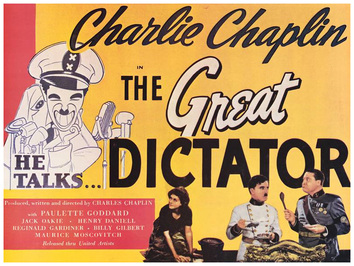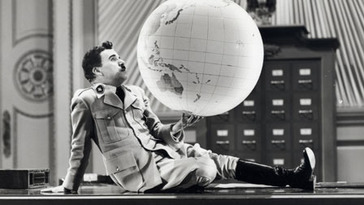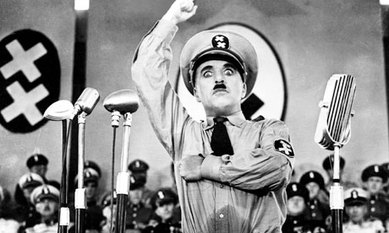
Arguably his greatest film (City Lights being the real challenger), and certainly his most financially successful film, The Great Dictator was something Chaplin had been working on for years before its release, as he watched the steady rise to power of Adolf Hitler in the newsreels. Indeed, it was upon his viewing of Leni Riefenstahl’s 1935 Triumph of the Will that was reportedly the clinching moment that prompted Chaplin to undertake his satirical swing at Hitler and the growing Nazi menace. As it is, Chaplin himself later said that if he had known the true horrific extent of Hitler’s murderous regime, then he wouldn’t have made the film. However, had he not, we wouldn’t have the impassioned call for humanity and kindness that we have in The Great Dictator.

It’s often regarded as Hitler’s great strength that he was a capable and forceful orator, someone who could whip up an emotional frenzy in his audiences, and Chaplin proved here that he was more than equal to the task of doing the same with this speech. Chaplin had long held off on adopting sound technology in his films, before really only dabbling in its use in Modern Times, with the use of actual spoken dialogue being eschewed in favour of synchronised sound effects and words of a sort coming from machinery. However, with The Great Dictator, Chaplin plunged fully into the sonic world of “talkies”, making it the first time he had really addressed the audience in a manner beyond the way he would normally do so. And it works beautifully.

Setting the scene: At a victory rally after the defeat of Osterlich, the barber, taken for all but his old comrade as the conquering dictator, is introduced to the crowds as Adenoid Hynkel. Expected to speak to the masses about the continued march of the anti-Semitic regime, the barber hesitates. A few words from his old comrade sees him reluctantly take the stage where, before the millions before him and those listening on radios, he delivers his speech…

 RSS Feed
RSS Feed
